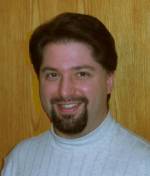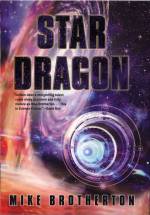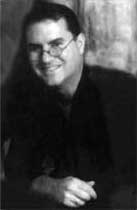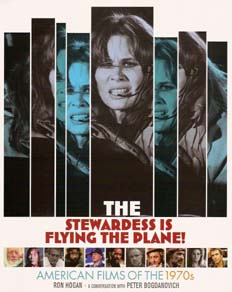
February 19, 2005
Author2Author: Mike Brotherton & Jonathan Lyons, Bonus Round
(The discussion between science fiction authors Jonathan Lyons and Mike Brotherton that took place all this week on Beatrice concludes with a few more questions about what's in their ears and their minds when they sit down to write...)
 Mike Brotherton: I thought it was interesting that Machina has a "soundtrack,” as I write with a soundtrack myself. It has been too long since writing the first draft of Star Dragon to recall what I was listening to specifically for that book, but my more recent novel, Spider Star, relies on Greek mythology in part, and I've been listening to heavy metal songs by Manowar and Iron Maiden based on such mythology while writing some sections. Sometimes I listen to classical music, rock, or electronica: The associations I have with the music are more important than the style of the music or the style of the piece. What are your preferences for music, if any, while writing and how is the selection dependent on the project?
Mike Brotherton: I thought it was interesting that Machina has a "soundtrack,” as I write with a soundtrack myself. It has been too long since writing the first draft of Star Dragon to recall what I was listening to specifically for that book, but my more recent novel, Spider Star, relies on Greek mythology in part, and I've been listening to heavy metal songs by Manowar and Iron Maiden based on such mythology while writing some sections. Sometimes I listen to classical music, rock, or electronica: The associations I have with the music are more important than the style of the music or the style of the piece. What are your preferences for music, if any, while writing and how is the selection dependent on the project?
Jonathan Lyons: Yes, music is very important to me. I'm working to integrate it more and more into my writing. I've never been much of a metal fan, though it's always lurking there, at the edges of what I do listen to--I've always tended toward more industrial/experimental and atmospheric music. Skinny Puppy are my heroes, and Austin space-rock legends ST-37 are not to be missed. But industrial crosses over with metal at times: Ministry comes to mind, and who can account for the metal/industrial/nightmare-anime-come-to-life antics of GWAR? Skinny Puppy's "Tin Omen" dances close to the line, to say nothing of how much they use actual metal on metal in their music, as opposed to metal as a music genre. Metal-on-metal brings Einsturzende Neubauten to mind ...
Without affectation--and to the occasional chagrin of my wife when she's trying to work--I honestly write at all times with music of some sort going in the background. Most often something atmospheric, but dark, such as O Yuki Conjugate, or Lustmord, Raison D'Etre, Lycia and/or Mike Vanportfleet (his new stuff is amazing!). I love the newest work from Lithivm, a group on the amazing Swedish label Cold Meat Industry. And sometimes, when I need to just get it all out of my system, grunge-when-grunge-wasn't-cool pioneers Mudhoney, Iowa City metalcore legends of yesteryear Iowa Beef Experience and old-school industrial monstrosity Stickdog help me get it all out of my system. I also have to admit a closet love for Iron Maiden's "Run to the hills"--it was on MTV when we first got cable growing up.
About the theme of big game hunting in Star Dragon: Was that simply a nod to Hemingway, or something more?
Mike Brotherton: I started off with the idea of "hunting" for a star dragon, and decided that Hemingway resonated with that idea. Initially the ship was just going to be decorated with a Hemingway motif, but then, as we discussed earlier, that grew into the ship's AI being patterned off of Hemingway’s personality. I read a bunch of his hunting stories, and bought a rifle and learned to shoot.
One thing that motivates me as a writer is playing fair with the universe. I mean, I have my own particular biases as a human being, but are they all fair? Probably not. I went vegetarian for over a year while involved with Star Dragon (okay, vegequarian, since sushi is too good to skip), while at the same time writing some hunting scenes. There are six billion people on Earth, and there are at least six billion perspectives on living a human life. I reduced the six billion to six, and placed ridiculous restrictions on them. I bet nearly everyone would kill to live. A smaller number would kill animals if it weren't needed. What's an animal? A soulless thing here for the eating to some, a fellow creature equal to us to others. To me, I don't really know, but I could see both sides and tried to put that in the book. If I can see the perspectives fairly, I can present some complex ideas and help people grow their perceptions. Perhaps that's pretentious, but isn't all writing at least a bit pretentious?
February 17, 2005
Author2Author: Mike Brotherton & Jonathan Lyons, pt. 4
(After asking each other questions about professional astronomy and Austin sci-fi circles, yesterday Jonathan brought up the Hemingway AI that commands a starship in Mike's novel. So now Mike's curious about aspects of Jonathan's story...)
 Mike Brotherton: There have been other science fiction writers to tackle ideas about universal observers, the key concept in Machina. Rick Wadholm's "The Ice Forest" and Greg Egan's novel Quarantine come to mind. Have you read these, or other science fiction with similar ideas, that helped shape Machina? Greg Egan, in particular, strikes me as an author who works in your philosophical science areas with my scientific rigor, a hybrid between us.
Mike Brotherton: There have been other science fiction writers to tackle ideas about universal observers, the key concept in Machina. Rick Wadholm's "The Ice Forest" and Greg Egan's novel Quarantine come to mind. Have you read these, or other science fiction with similar ideas, that helped shape Machina? Greg Egan, in particular, strikes me as an author who works in your philosophical science areas with my scientific rigor, a hybrid between us.
Jonathan Lyons: I haven't read those, but I take reading suggestions from readers as informed as you seriously, and I've added those to my list of must-reads. But no, my vision is the result of a great deal of trouble accepting the standard Judeo-Christian mythology and its two different accounts of creation; for example, I had trouble accepting what we're told to believe about God, whatever God is. I have had a long-standing interest in philosophers' attempts to explain the nature of reality, as well as the quantum mechanics/ field theory/ string theory ideas. Add to that mix the paranormal--ghosts, reincarnation claims, etc.--and I found myself, over the years, obsessing over dreaming up some way to explain the whole thing, a way that wasn't necessarily wed to the old explanations. Hence, Machina, the novel that serves as my vehicle for that philosophical/metaphysical construct.I didn't even know, really, whether I could pull it all together. Then, when I'd finished, I had a final product that was so utterly strange that I didn't know whether I could ever get it published. I subbed it around to publishers for a year, getting nothing, then tried again. Double Dragon picked up electronic rights and, frankly, I didn't know whether it would go any further. A few months later, all at once, in the same week, three publishers were abruptly interested, but also required electronic rights. Double Dragon could not relinquish those rights, but seeing the difficulty the situation placed upon me, publisher Deron Douglas stepped up with a print contract.
(Stay tuned this weekend for the final installment of this week's Author 2 Author, with a final question for and by each writer! And then prepare yourself for a change of pace next week, when Elizabeth McKenzie, author of Stop That Girl, will not ask Curtis Sittenfeld if Prep is about her own teen years...)
February 16, 2005
Author2Author: Jonathan Lyons & Mike Brotherton, pt. 3
(Now that we've heard about Mike Brotherton's astronomy career and Jonathan Lyons's literary experiences in Austin, the subject of their email correspondence turns to their books...)
 Jonathan Lyons: Of all the cast and crew in Star Dragon, the most interesting and engaging was, for me, Papa, the ship's brain. Half organic, human intelligence, half advanced computer technology, and wrapped up in a simulated Hemingway persona? That's not only nuts, but great reading. Taking it further, Papa's obvious frustration with his natural urges (to report Henderson's über-eugenic urges, Papa's human side's feelings for Fang, etc.) being preempted by programming; and his papa-"daughter" relationship with Capt. Fang. I think I'd like to hear you talk a bit about Papa and tell us a bit about who he is.
Jonathan Lyons: Of all the cast and crew in Star Dragon, the most interesting and engaging was, for me, Papa, the ship's brain. Half organic, human intelligence, half advanced computer technology, and wrapped up in a simulated Hemingway persona? That's not only nuts, but great reading. Taking it further, Papa's obvious frustration with his natural urges (to report Henderson's über-eugenic urges, Papa's human side's feelings for Fang, etc.) being preempted by programming; and his papa-"daughter" relationship with Capt. Fang. I think I'd like to hear you talk a bit about Papa and tell us a bit about who he is.
Mike Brotherton: Since the whole book is a hunt, in a sense, I hit on the idea of using Hemingway thematically. Initially that was just going to be in small ways: ship decoration, allusions or metaphors. Then I decided that any spacecraft a few centuries or more into the future would be controlled by an artificial intelligence, and that such an intelligence would have to have a personality, so Hemingway came naturally. But it couldn't be completely free. I mean, imagine your home controlled by a computer. You want it to be there, to make everything run better, but you don't want to hear it say a word about how messy you are, how you drink too much, or anything at all about your masturbatory fantasies. Therefore, it must have restrictions. The original story about an all-seeing artificial intelligence driven crazy by conflicting orders was Arthur C. Clarke's HAL, and I figured any run of the mill home computer or spaceship AI would be constantly teetering on the edge of conflict without being given directly conflicting orders. Hemingway himself was such a larger than life character that any way you might try to box him in would produce interesting conflict. This would be interesting, but this wasn't the half of it.Papa is not human. He's not even completely organic. He's part computer, part organic brain. We're going to be able to make shit like this, someday. I guarantee it. What happens if you make a human mind, but don't put it in a human body? More conflict. Our minds and our bodies are linked, at least until we get smarter about what both those things are. It really is intrinsically interesting, not only abstractly, but personally. Imagine a heaven, or a hell, in which you are you, but not in your own body. In something else, very, very different than a human body. How can that not be interesting? It could be awful, or wonderful, depending on perspective, but it would definitely be interesting.
Moreover, there would be programming, trying to keep forcing you to be a particular person (i.e., Hemingway) even when every input screams you are something else. I don't see any way to get this right, not right away, even though such a creation would be invaluable running something like a spaceship. The future is going to be an interesting place, and from an ethical perspective, it'll probably be in the sense of that old Chinese curse: "May you live in interesting times."
February 15, 2005
Author2Author: Mike Brotherton & Jonathan Lyons, pt. 2
(All this week, Beatrice is featuring an exchange between science fiction authors Jonathan Lyons and Mike Brotherton. Yesterday, we found out about Mike's scientific background. Now, the subject turns to Jonathan's literary roots...)
Mike Brotherton:I realized that you have an Austin, TX connection. So do I. I got my Ph.D. in astronomy from the University of Texas (1990-1996), and was part of a writing group there called the SlugTribe that included a number of accomplished, published authors (Wendy Wheeler, Jay Lake, William Browning Spencer). Bruce Sterling, Bradley Denton, and other well-known SF authors also live in the city. What is it about Austin and writing? Or is it just a coincidence?
Jonathan Lyons: We lived in Austin from the summer of 1997 to the summer of 2003. We moved there from Iowa City for my wife's grad degrees, then to Bombay for a year for her research, then out here, to the San Francisco Bay Area, for my MFA at the California College of the Arts Grad Writing Program. I know of SlugTribe and Wendy Wheeler from my participation as a guest author at several ArmadilloCons, ConSortiums, and a few others--you guys have a big reputation. In fact, it seems likely that I would have been seated within eyesight of you at some point at one of those. How'd we miss each other?Bruce Sterling is a friend; he invited me into the membership of Turkey City. Austin does have a great writing community and a very active and supportive speculative fiction community, rife with the weird characters you'd expect in such a scene and rife with talent. I'm not sure what the overall recipe is for all that; a greater Austin area with a population of 1 million+ can't hurt. The James Michener Center at UT-Austin adds to it all. And it's a very literate city. The guys from local space rock band ST-37, for example, have an extended book-sharing group. Listen to their music and you can catch literary and cultural references all over. I don't think I can count the Texas Book Festival, though; they seem more focused on coffee table books and gift books than literature.
I worked as a copy editor and, later, a Web specialist for the Austin American-Statesman. I remember getting off duty at one, two, three in the morning, back before the current airport was open. There was something about the skyline at night as I drove north over the Congress Street bridge, the buildings outlined in technicolor neon, small planes flying in low toward the old airport--it looked like a cross between cityscape scenes from Metropolis, Blade Runner, a dash of Tron. It was amazing--a scene that seemed to tell me that Austin's skyline was, itself, science fiction! I wrote much of my first novel, Burn, after driving home through that vaguely Gernsback vision. Perhaps other writers and would-be writers experience their own speculative vision of the city, as well ... there's a magical, otherworldly aspect to Austin.
February 14, 2005
Author2Author: Jonathan Lyons and Mike Brotherton
Although Jonathan Lyons is currently finishing up an MFA in creative writing, he's already got two of his most important credentials: the science fiction novels Burn and Machina--the latter of which has been nominated for the James Tiptree Jr. Award. Because Machina was first published in an electronic edition, I thought it might be interesting to "introduce" Lyons (via email) to Mike Brotherton, whose debut novel, Star Dragon, just came out in paperback but is also available online as a free download under a Creative Commons license. Mike's day job being what it is, though, the conversation started out on an extra-literary note:
 Jonathan Lyons: Before getting to your novel, I really wanted to get some background on your NASA projects and experiences. We've been following the news on the Titan lander and have been astounded by the photos it's managed to send back. So, Mike, please tell me about your experiences.
Jonathan Lyons: Before getting to your novel, I really wanted to get some background on your NASA projects and experiences. We've been following the news on the Titan lander and have been astounded by the photos it's managed to send back. So, Mike, please tell me about your experiences.
Mike Brotherton: I work on everything related to active galactic nuclei, the most extreme of which are quasars. That is, supermassive black holes at the centers of galaxies chowing down on some fuel. I'm much more observational/experimental than theoretical, and work in every part of the electromagentic spectrum (radio through X-rays). I've used the Hubble Space Telescope (and as I write this, it’s a sad week for Hubble, its deathknell probably, with a refurbishment mission cut out of the new NASA budget), the Chandra X-ray Observatory, and a dozen or two other telescopes. I've served on review committees for Hubble, Chandra, the NSF, NASA's Infrared Telescope Facility, etc. I'm an active part of the professional astronomical community. Very recently, my postdoc and I landed just over $800,000 in NASA funding to study a couple of different aspects of quasar science over the next several years.
I'm definitely in the two-career mode here, with astronomy and writing, and hope to pull it off. Gregory Benford is probably the best model for me to follow. While Star Dragon was a finalist for the John W. Campbell award for best science fiction novel, unfortunately I'm pretty far from winning a Nebula like Benford did with Timescape. I'm just hoping to make my two careers synergistic, with the astronomy amplifying my science fiction in particular ways, and my science fiction serving as a vehicle for public outreach/education for the astronomy.
In particular, I used to suffer a form of writer's block, if you will, when it came to writing about things close to my science. My brain was too critical, and I rejected speculative elements too readily. My solution with Star Dragon was to switch to interesting binary stars, which had elements in common with quasars (like accretion disks), but were not things I was so familiar with I had the block. A lot of my early stories were fantasy or science fiction horror. I had to make some effort to play to my hard science fiction strengths.
